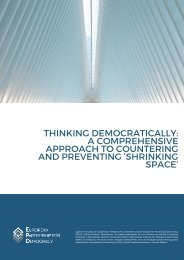Repression and resilience: Diagnosing closing space mid-pandemic
Create successful ePaper yourself
Turn your PDF publications into a flip-book with our unique Google optimized e-Paper software.
14 REPRESSION AND RESILIENCE: DIAGNOSING CLOSING SPACE MID-PANDEMIC<br />
journalists during the p<strong>and</strong>emic, with 65 violations of<br />
journalists’ rights reported from <strong>mid</strong>-March to the end<br />
of July, particularly online aggression against female<br />
journalists. A similar situation unfolded in Honduras, with<br />
41 aggressions against journalists during the lockdown.<br />
While assassinations of journalists are extremely rare in<br />
Venezuela, two such killings happened in August.<br />
The consistent increase in human rights violations of<br />
civil society, media workers, <strong>and</strong> activists is mirrored in<br />
other research. According to a report recently released<br />
by Human Rights Watch 23 , in more than 90 countries<br />
around the world governments have used COVID-19 as<br />
justification to silence criticism of the measures taken<br />
to contain the spread of the virus, but several have also<br />
suppressed dissent unrelated to the p<strong>and</strong>emic. Violations<br />
against human rights defenders, journalists <strong>and</strong> activists<br />
include physical abuse, killings, arbitrary detentions<br />
<strong>and</strong> trials, shutdown of the media, <strong>and</strong> the enactment<br />
of vague laws criminalizing assembly, speech <strong>and</strong> the<br />
spread of alleged misinformation.<br />
Various countries, including Honduras <strong>and</strong> Kenya, saw<br />
freedom of expression <strong>and</strong> the press hampered as a<br />
result of restrictions on the work of the press, arbitrary<br />
detentions of journalists, <strong>and</strong> limitations in their work due<br />
to curfews. According to the 2020 Report of the Varieties<br />
of Democracy Institute, repression of civil society,<br />
freedom of expression, <strong>and</strong> media intensified in 2020 <strong>and</strong><br />
has been further exacerbated by the COVID-19 p<strong>and</strong>emic<br />
due to the derogation of non-derogable rights in some<br />
countries. 24 In these cases either the government failed<br />
to protect their citizens, or it was the main perpetrator of<br />
the infringements on fundamental freedoms.<br />
Freedom of assembly <strong>and</strong> the right to protest became<br />
particularly contested during the various lockdowns. A<br />
global analysis by Amnesty International concludes that<br />
most governments, including European ones, imposed<br />
blanket bans on protests <strong>and</strong> demonstrations, with<br />
excessive force used in cracking down on them. 25 26 Many<br />
governments enforced curfews too, which limited both<br />
journalistic activities <strong>and</strong> civil society activities. Where the<br />
opposition had successfully mobilised numerous largescale<br />
protests in Venezuela ahead of the p<strong>and</strong>emic, the<br />
lockdown saw such violent police repression of protests<br />
- with the use of firearms, tear gas, <strong>and</strong> illegal searches<br />
<strong>and</strong> seizures of both protestors’ <strong>and</strong> onlookers’ homes<br />
- that citizens were deterred from participating. Political<br />
protests made way to protests calling for food security<br />
<strong>and</strong> basic public services. When political protests did take<br />
place, protestors <strong>and</strong> organisers were often discredited<br />
for being disloyal at a time of crisis <strong>and</strong> for flaunting<br />
social distancing rules.<br />
Militarisation<br />
Along with the state of emergency, many countries<br />
placed the military at the forefront of the p<strong>and</strong>emic<br />
response. This was done through increased budgets, an<br />
increased role in non-military activities <strong>and</strong> public life, <strong>and</strong><br />
soft power campaigns seeking to boost the public image<br />
of the military, as observed in El Salvador, Guatemala,<br />
Indonesia <strong>and</strong> Venezuela. Patrolling the streets to ensure<br />
compliance with p<strong>and</strong>emic measures, the military was<br />
in some cases responsible for arbitrary <strong>and</strong> illegal<br />
detentions, brutality towards citizens, unwarranted house<br />
seizures, extrajudicial killings, <strong>and</strong> the disproportionate<br />
use of specific state of emergency powers (El Salvador,<br />
Venezuela, Guatemala, Indonesia, Ug<strong>and</strong>a).<br />
The p<strong>and</strong>emic provided an excuse to place the military<br />
at the heart of public life <strong>and</strong> increase the powers of the<br />
military, in some cases empowering them to dissolve<br />
demonstrations <strong>and</strong> arrest people without a warrant<br />
23 Human Rights Watch (2021): Future Choices - Charting an Equitable Exit from the COVID-19 P<strong>and</strong>emic. Available here.<br />
24 V-Dem (2021): Autocratization Turns Viral - Democracy Report 2021. Available here.<br />
25 Amnesty International (2021): Amnesty International Report 2020/21: The state of the world’s human rights. Available here.<br />
26 Not all countries restricted the right to protest. Countries like Brazil <strong>and</strong> Nicaragua allowed for demonstrations to continue well after the<br />
first cases of covid were discovered. In these cases, however, this was linked to an unwillingness to limit economic activity <strong>and</strong> acknowledge<br />
the severity of the crisis.

















